
хобби
.pdf
When you’ve guessed what it is, ask some of the questions in the Comprehension check above.
How long have you been collecting?
3. ‘Pet Hates’
Listening [T.3]
Most people have something in particular that they dislike doing – maybe getting up early or waiting in queues. We call these things ‘pet hates’.
A.Some friends are discussing their pet hates. Listen to the dialogue and answer the following questions:
1.How many people are talking?
2.Are they enjoying themselves?
3.Are the speakers students or working women?
4.Do they all hate paying taxes?
5.Do they hate going to the cinema?
B.Read the list of pet hates. Listen to the cassette again and
put a tick by the pet hates the speakers mention:
1. |
cleaning the bath |
10. |
having to wear smart |
2. |
queuing for the bus |
clothes to work |
|
3. |
cooking cabbage |
11. |
playing sports |
4. |
cleaning fish |
12. |
going to the dentist |
5. |
being late |
13. |
doing exams |
6. |
going for interviews |
14. |
eating out alone |
7. |
going to see their bank |
15. |
meeting people |
manager |
16. |
getting up early |
|
8. |
paying tax |
17. |
cleaning the lavatory |
9.queuing for the cinema
С. Now underline your pet hates. You will need this for the Development exercise.
81
Pronunciation
On the tape you will hear some phrases we use to agree and disagree with each others’ opinions and experiences. Listen and repeat.
Development
In pairs, discuss your pet hates, and the pet hates of members of your family and friends. Use the list to give you ideas. Discuss in pairs, and give your opinions and experiences.
Vocabulary Bank: life style, to bear, to be crazy about, to dislike, to be fond of, to hate, to be keen on, to mind
II. A Couch Potato
Are you a couch potato?
VOCABULARY & READING
1. Look at these words to express likes and dislikes. Put them in order from positive to negative.
all right awful |
boring |
brilliant dreadful dull exciting fun |
great nice OK |
relaxing |
superb terrible terrific wonderful |
82

2. Look at the leisure activities in the box below. What's your opinion of them? Use the words in the box in 1.
football |
tennis |
cricket |
do-it-yourself (DIY) |
fishing |
||
gardening |
entertaining |
shopping |
going |
to |
nightclubs |
|
watching |
television |
reading |
painting |
bird-watching |
||
train spotting playing cards |
swimming |
running |
walking |
|||
I think football is boring.
Which other leisure activities do you like and dislike?
3. “Are you a couch potato?” is about leisure activities. Read it and choose the best definition for a couch potato.
1.Someone who enjoys energetic sports and active hobbies.
2.Someone who takes little or no exercise, and who spends their free time doing very little.
3.Someone who doesn't like doing sports but is active in other
ways.
4.Someone who likes indoor gardening.
Are you a couch potato?
Centuries ago, people didn't have much free time, because everybody was working too hard. In Britain in the nineteenth century, people had more spare time, but because the Victorians hated relaxing and doing nothing, they invented football, rugby and cricket. People took up more gentle activities too, like gardening, bird-watching and train spotting, and it was even possible simply to watch a sport and give the impression that you were actually doing something. Gradually, leisure activities have become less and less demanding and most people have a variety of more or less energetic interests and hobbies But now there is a new type of person who thinks that lying on the sofa watching television on Sunday afternoon or reading the newspaper from cover to cover is the most exciting activity they can manage. This is the twenti- eth-century couch potato. For them, every activity is too much trouble, and laziness is an art form! So how do you spend your free time?
Are you a couch potato?
83
4. Work in pairs. Decide how energetic the activities in the box in 2 are. Give them a score from 1 (= lazy), to 10 (= energetic).
LISTENING [T.4]
1 . Listen to nine people talking about what they like doing. Put the number of the speaker by the activity in the box in Vocabulary and reading 2 which they like doing.
2. Work in pairs and decide how old each person might be. Which person or people would you describe as a couch potato? What else did they say about their leisure activities?
Listen again and check.
FUNCTIONS AND GRAMMAR
Adverbs and adverbial phrases of frequency
Adverbs of frequency usually go before a full verb, but after be or an auxiliary verb.
I always spend the weekend doing housework. She sometimes likes playing cards.
I am often out in the evening. I’ve never enjoyed football.
I hardly ever go to the cinema.
Here are some common adverbial phrases of frequency. They usually go at the end of a clause.
every day, week, month, year, two days, other day, now and then once/twice/three times a day, a week, a month, a year
most days, mornings, once in a while
Talking about likes and dislikes
You can put an -ing form verb or a noun after the following expressions.
I adore shopping. I love entertaining. I enjoy watching television. I hate running. I can't stand staying at home.
I detest collecting the leaves.
84

I don't mind spending Saturday with the children.
Verb patterns (1): to or -ing
Like and love + -ing means enjoy doing something.
I like going shopping. = I enjoy it.
Like and love + to + infinitive suggests that you choose to do something because it's a good idea.
You may or may not enjoy it as well.
I like to go shopping on Mondays. = Mondays is the best time for me to go shopping.
Remember that you can use would love/like to + infinitive to talk about ambitions, hopes or preferences.
I'd love to learn to ski. I’d like to have lessons this winter.
Exercises
1.Write sentences saying how you feel about these activities.
–shopping
–bird-watching
–swimming
–train sporting
2.Choose the best verb pattern. If two answers are possible, explain the difference in meaning.
1.I like to go/going to the dentist every six months.
2.She likes to get/getting home before it’s dark.
3.She likes to visit/visiting her parents.
4.He likes to do /doing the washing on Mondays.
3.Write sentences saying how often you do the following activities. Make sure you put the adverb or adverbial phrase in the right position.
1. have a holiday |
3. |
listen to the radio |
2. read a newspaper |
4. |
go to the cinema |
85
SPEAKING AND WRITING
1.Work in groups of three or four and find out if there are any couch potatoes in your class.
1.Make a list of your five favourite free time activities.
2.Give each activity a score from 1 (lazy) to 10 (energetic).
3.Add up the scores for your activities. Is the person with the lowest score a couch potato?
2.Go round the class asking and talking to people in other groups about your favourite and least favourite leisure activities. Find out if there are any other couch potatoes in your class.
3.Write a paragraph about what three or four people in your class enjoy doing. Use linking words and, but and because.
- Say what they like doing.
Federico likes going to football and tennis matches…
- Say why they like doing it.
... because he thinks they're very exciting.
- Say if they dislike anything.
... but he can’t stand the crowds.
Say how often they enjoy doing it.
He goes five or six times a year.
86
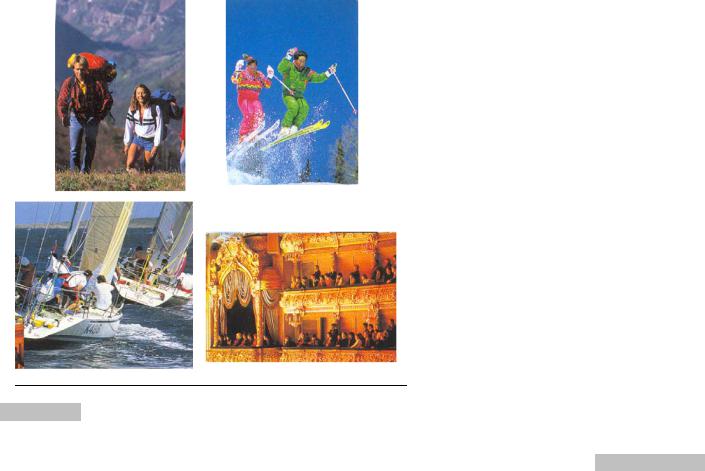
III. Sports and Leisure Activities
Leisure Time
Speaking
Work in groups of four. On the right is a list of leisure-time activities. Tick (√) the activities that you are interested in. Then record the preferences of the other students in your group.
When you have collected the information from your group, work with your teacher to produce an overall preference for your class.
87
|
Activity |
Students |
Group pref- |
Class prefer- |
|
|
|
who like |
erence |
ence (Num- |
|
||
|
|
|
this |
(Number) |
ber) |
|
|
Skiing |
|
|
|
|
|
|
Camping |
|
|
|
|
|
|
Hiking |
|
|
|
|
|
|
Swimming |
|
|
|
|
|
|
Sailing |
|
|
|
|
|
|
Cycling |
|
|
|
|
|
|
Other: |
|
|
|
|
|
|
Collecting: |
|
|
|
|
|
|
- |
stamps |
|
|
|
|
|
- |
coins |
|
|
|
|
|
Going to: |
|
|
|
|
|
|
-the cinema |
|
|
|
|
|
|
-the theatre |
|
|
|
|
|
|
-concerts |
|
|
|
|
|
|
-museums |
|
|
|
|
|
|
-zoos |
|
|
|
|
|
|
-parks |
|
|
|
|
|
|
-the seaside |
|
|
|
|
|
|
Reading |
|
|
|
|
|
|
Listening to mu- |
|
|
|
|
|
|
sic |
|
|
|
|
|
|
Watching TV |
|
|
|
|
|
|
Meeting friends |
|
|
|
|
|
|
Playing cards, |
|
|
|
|
|
|
chess |
|
|
|
|
|
|
|
|
|
|
|
|
Listening [T.5]
1. Listen to a young person talking about an unusual leisure activity and tick (√) the picture which best illustrates his hobby.
88
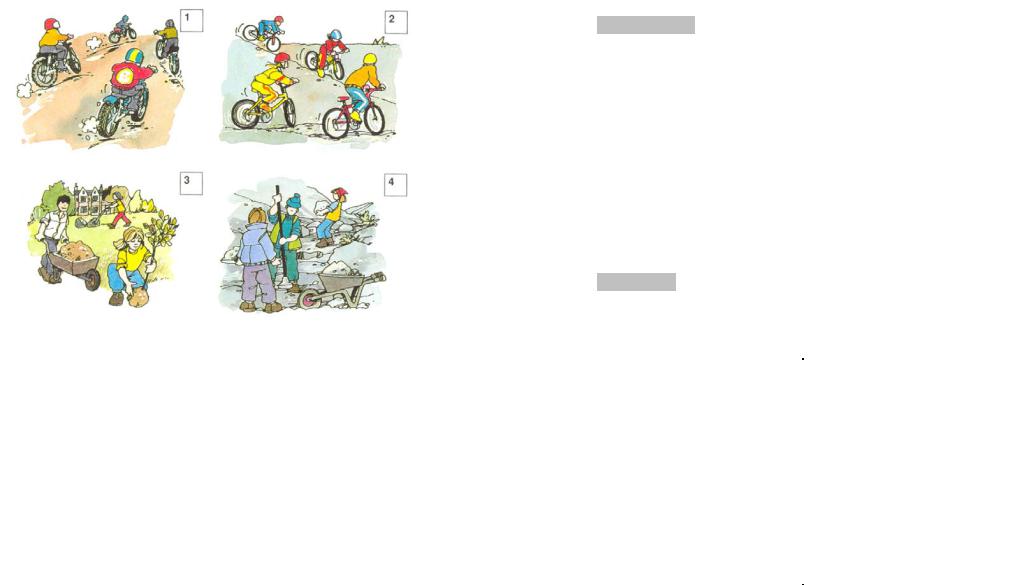
2. Now study the questions below. Choose the correct answers from the choices given. Then listen to see if you were right.
1.Alan Ainslie is riding to Brighton this weekend: а) for charity;
b)by an unusual route;
c)with 25,000 others;
d)with some friends from a cycling club.
2.According to the law, cyclists are not allowed on:
a) bridle paths; |
c) river banks; |
b) footpaths; |
d) disused railway tracks. |
3.Alan has not published his routes because:
a)they would be used by people on motor bikes;
b)they are only suitable for mountain bikes;
c)it would be a nuisance to hikers and ramblers;
d)it would spoil the pleasure of rough cycling.
89
Language Focus
Future continuous
Use a suitable verb in the future continuous tense to complete the following sentences.
1.While most of the cyclists going to Brighton are going by the main road, Alan and his friends _______ on bridle paths and footpaths.
2.Next week, Rachel _______ another speaker to her programme and he/she ____ listeners about his/her spare-time interests.
3.I'm so happy I'm going on holiday. This time next week _____
on a beach in Greece.
4.I (not) _______ for my food, because it's all included in the package holiday.
5.I ______ all that lovely Greek food and drinking their exotic
drinks.
Speaking
Making a speech
Prepare to give a two-minute talk to the class about a spare-time activity you are interested in. Use the questions below and Alan's answers (when he gave a similar talk) to help you form a rough plan.
Type of information to cover |
|
Alan's answers |
|
1 |
What is your spare-time inter- |
|
Rough cycling. |
est? |
|
|
|
2 |
Why does it interest you (in |
|
Get out of the city - finding new |
general terms)? |
|
routes - sense of adventure. |
|
3 |
When and why did you start |
|
Cycling club - bored - too much |
this hobby? |
|
traffic - no time to enjoy view. |
|
4 |
What does it consist of? |
|
Finding routes - cycling off roads |
|
|
|
through countryside. |
5 |
What do you do? Is it a hobby |
|
Go along footpaths, bridle paths - |
you do alone or with others? |
|
can go alone, but with friends. |
|
6 |
How often do you participate in |
Every weekend. |
|
this sport? |
|
|
|
7 |
How do people interested in |
|
|
|
Ring Central Office for informa- |
||
this sport become involved? |
|
tion. |
|
|
|
90 |
|
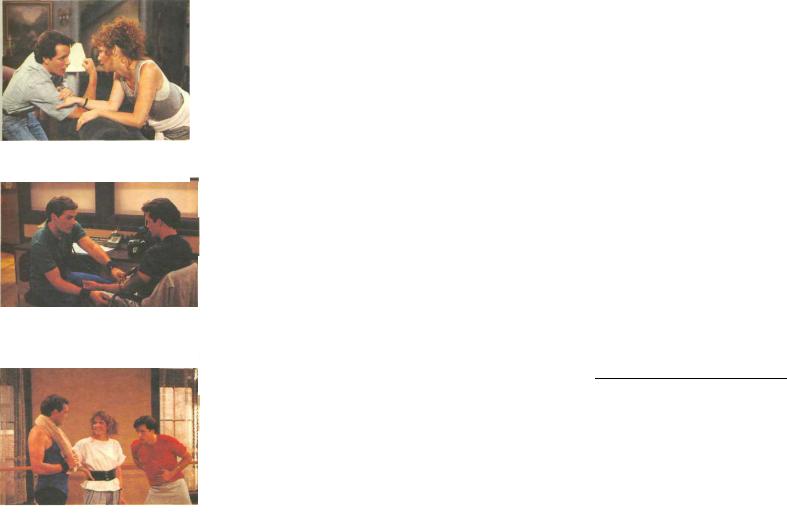
ACT I
ACT III
ACT III
Video
Aerobics
“A Piece of Cake”
In this episode, you will study
VOCABULARY
aerobics kidding bet twist
GRAMMAR AND EXPRESSIONS
It's a snap.
No sweat.
It's a piece of cake.
How much? and How many?
PRONUNCIATION
can (cn)
What do you . . . ? (Waddaya) did you (didja)
don't you (dontcha)
U.S. LIFE
What do Americans do to stay healthy?
YOUR TURN
What kinds of exercises are popular in your country?
Here is the complete script with study material. Use these materials before or after you watch.
91
ACT I
Outside the Stewarts' house early Friday evening. Marilyn Stewart rides to the house on a bicycle. Inside, her husband Richard is looking at photos in his album. Marilyn enters and sits on the floor.
I am exhausted.1 My new exercise class is so hard. Your new exercise class?
Yeah, My new advanced2 exercise class. Why advanced?
My instructor thought that the beginner's class was too
[He laughs because she looks so tired.] Too easy for you? [He helps her stand up.]
Don't laugh. In the beginner's class, they give you a chance to rest between exercises.
So?
The advanced class is nonstop.3
[He teases4 her.] I lift weights every morning for sixty minutes without stopping. [He shows her his arm muscle.] No problem. 5
Listen, Richard, doing aerobics6 for an hour is a lot different than7 lifting weights.
The better form is different from. Like Marilyn, some Americans use than after the word different.
Richard: |
Yeah. Quite a bit different. I think aerobics is easy. I |
|
could8 work out9 in your class with no problem. |
Marilyn: |
You think so? |
1exhausted: very tired
2advanced: more difficult
3nonstop: without stopping
4teases: annoys by joking with someone
5No problem. - It's easy.
6aerobics: exercises for good breathing and a strong heart
7different than
8I could ... = It is possible for me to...
9work out: to exercise
92

Richard: |
Oh, without a doubt.10 When's the next class? |
Marilyn: |
Tomorrow morning at ten o'clock. Try it. |
Richard: |
Tomorrow morning after lifting weights, I'll try aero- |
|
bics. [He snaps his fingers.] It's a snap.11 Tomorrow |
|
morning at ten o'clock. |
In Richard and Marilyn's room the next morning. Richard is lifting weights. Marilyn is sewing.
Marilyn: Aren't you going to the aerobics class this morning?
Richard:
|
sweat.12 |
Marilyn: |
You are not going to be able to move after this and the |
|
aerobics class. |
Richard: |
Are you kidding13 me? It's going to be a piece of |
|
cake. 14 |
[Marilyn shakes her head no.]
Richard: You want to bet? 15
In Do you . . . questions, it is common not to say Do. Also, Richard pronounces want to as wanna. This is a common informal pronunciation.
Marilyn: |
Yeah. What's the bet?16 |
Richard: |
I bet I can go17 one hour in your class this morning and |
|
not feel a thing! |
10without a doubt: sure; of course
11It's a snap. = 12No sweat.
Both expressions mean "It's easy."
13kidding: joking with
14a piece of cake: easy
15You want to bet? = Do you want to bet?
bet (verb): to agree to pay or do something, as in a game
16 bet (noun): an agreement between two persons to pay or do something if one person is wrong
93
Marilyn: |
The bet is – I win, and you cook dinner for the entire18 |
|
family. Or you win, and I cook dinner for the entire |
|
family. |
Richard: |
[He shakes her hand.] It's a bet. |
Marilyn: |
OK. Call my instructor, Jack Davis, right now. His |
|
number is 555-8842. The advanced class starts at ten |
|
o'clock. |
Richard: |
Well, it's eight twenty now. |
Marilyn: |
It only takes eight minutes by bicycle to the aerobics |
|
class. Give him a call. |
[Richard calls Jack Davis.] |
|
Jack: |
Davis Aerobics Center for Good Health |
Richard: |
Jack Davis, please. |
Jack: |
This is Jack Davis. |
Richard: |
Hello. This is Richard Stewart. My wife, Marilyn |
|
Stewart, is a member of your program. I'd like to |
|
come to the ten o'clock advanced class this morn- |
|
ing. |
Jack: |
Oh, fine, fine. Be here a few minutes early. You |
|
need to complete some forms before the class. |
Richard: |
Thanks. I'm on my way over.19 |
Jack: |
Good-bye. |
Richard: |
Bye-bye. [He hangs up.] It's all set.20 I'm going. |
|
[He puts his camera bag over his shoulder.] |
Marilyn: |
Bye. Richard: See you later. [They kiss.] |
Marilyn: |
Good luck. |
Richard: |
Don't forget about the bet. Dinner for the entire fam- |
|
ily. And that includes Susan.21 |
17 I can go ... = I can exercise ...
Pronunciation: I cn go. When can has a verb after it, we do not usually pronounce the a in can because the word is not stressed. It is not a strong syllable in the sentence. (Here, go means "to exercise.")
18entire: whole
19on my way over: leaving for a place
20set: arranged
94
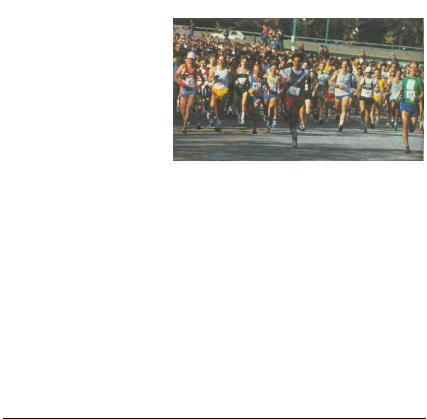
Marilyn: Don't you forget.
[Richard snaps his fingers and leaves. Marilyn snaps her fingers and smiles.]
END OF ACT I
U.S. LIFE
Aerobic exercises are very popular in the United States. Today, millions of Americans are exercising for good health. One out of every ten Americans exercises every day to stay in shape (in good physical condition). This fitness craze (interest in exercising and eating healthy foods) is popular all across the country.
Each year in many cities, including Boston, New York, San Fransisco, and Honolulu, there are longdistance races, or marathons. Even ordinary people run in these events. Every day in the United States, thousands of men, women, and children run
through parks or city streets for good health.
More than ever before, a good diet and exercise program are important in the United States. Today, fitness is part of the American way of life.
YOUR TURN
•What kinds of exercises are popular in your country?
•What exercises do you do every day?
21 And that includes Susan. (Susan is Richard's sister. She doesn't live with the family. She has her own apartment in Manhattan.)
95
ACT I
ACTIVITIES
Here are some activities to help you check your understanding of Act I.
IDIOMS IN ACTION
Answer each of the following questions. Tell the truth about yourself. Circle a, b, or c.
1.Can you run a mile?
a.Yes, it's a piece of cake.
b.Yes, but it's rough for me.
c.No, I can't.
2.Can you swim for half an hour without stopping?
a.Yes, it's a snap.
b.Yes, but it's tough for me.
c.No, I can't.
3.Can you touch your toes without bending your knees?
a.No problem.
b.Yes, but it's not easy for me.
c.No, I can't.
4.Can you lift thirty pounds?
a.No sweat.
b.Yes, but it's difficult.
c.No, I can't
5.Can you hold your breath for a minute?
a.Yes, it's a piece of cake.
b.Yes, but it's hard.
c.No, I can't.
IN FACT
Reread Act I to find the answers to these questions. Write the answers on the lines. Try to find all the answers in two minutes!
1.How long does Richard lift weights every morning?___________
2.What time is the next aerobics class? ____________
96

3.How long does Richard think he can exercise in the class?
___________
4.What is Jack Davis's telephone number? ________________
5. What time does Richard call Jack? _____________
6. How long does it take to get to the class by bicycle?
____________
THE BET
Marilyn and Richard make a bet about the aerobics class. Which two sentences explain their bet? Circle the numbers of the two correct answers
1. Richard will be able to do aerobics with no problem, and Marilyn will cook dinner.
2. Richard will not be able to do aerobics, and Marilyn will cook dinner.
3. Marilyn will be able to do aerobics with no problem, and she will cook dinner.
4. Marilyn will not be able
to do aerobics, and she will cook dinner.
5. Richard will not be able to do aerobics, and he will cook dinner.
ACT II
Outside, on a busy street in Riverdale. Inside, the Davis Aerobics Center for Good Health. Jack Davis is taking Richard's blood pressure.
Jack:
Richard:
1 120 over 75;
120 over 80 is perfect blood pressure.
97
Jack: |
Good. Do you have any back or knee problems? |
Richard: |
Nope.3 I am in perfect health. |
Jack: |
What do you do for a living,4 Mr. Stewart? |
Richard: |
I'm a photographer. |
Jack: |
Interesting. What do you photograph? |
Richard: |
Everything. The American scene. People, places, |
|
events. |
Jack: |
Did you5 ever think of photographing an aerobics |
|
class? |
Richard: |
No ... I can't remember taking pictures of people exer- |
|
cising. |
Jack: |
But don't you6 think it'd be a good subject? |
Richard: |
Sure. |
Jack: |
I need some good photos for my advertising, Mr. |
|
Stewart. Maybe you can photograph a class, and I can |
|
give you and Mrs. Stewart a month of classes-free. |
Richard: |
When can I photograph a class? |
Jack: |
Anytime.7 |
Richard: |
How about today? Terrific! |
Jack: |
Terrific! |
U.S. LIFE
Many Americans have a complete physical once a year. During a complete physical, the doctor checks the patient's pulse and blood pressure. The patient may also have blood tests and a chest X-ray. At the end of a physical, the doctor may recommend a fitness program (a diet and exercise) for good health.
3 Nope. = No.
This is a very informal word.
4What do you do for a living? = What is your job
A common pronunciation of What do you is Waddaya.
5did you
Jack uses the common informal pronunciation, didja
6 don't you
Jack uses the common informal pronunciation, don 7 Anytime. = It's not important when; you decide.
98
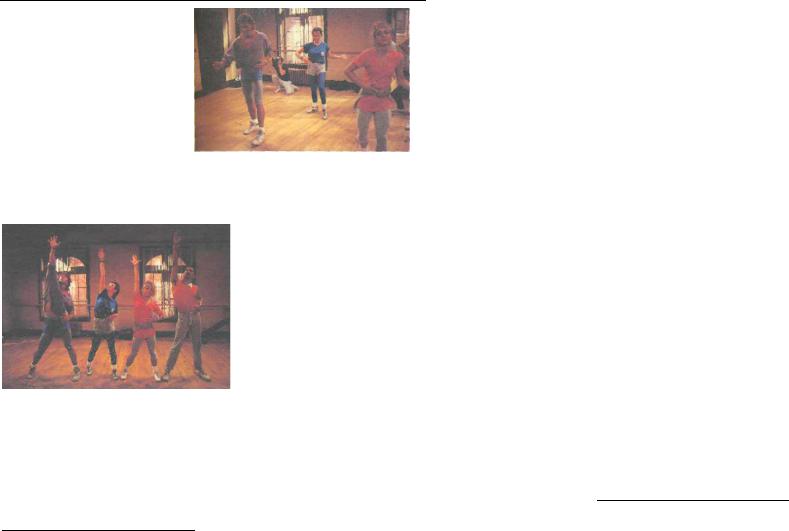
YOUR TURN
When was your last complete physical?
In the exercise classroom at the Davis Aerobics Center. Jack Davis and another instructor are about to teach a
class. |
Richard is taking |
many photographs. |
|
Jack: |
[He enters.] Hi. |
Instructor: Oh, hi. |
|
Jack: |
Are we ready to go? |
Instructor: Yeah. Yeah, [to students] Let's get in our lines. We're going to take it slow first. Stretch up ... and we're going to go left first... 2, 3, 4 ... now switch.8 . . . OK, hold to the right.
Sunrises. Stretch it out. Flat back. Bring it up ... and twists9 . . .and side ... 2, 3 ...
and left ... push ... push . . .
turn ... hit the floor. Take it side again.... OK, and switch. Stretch it out. And we're going to warm down with a tango. 10 Left, right. Enjoy it.
In Richard and Marilyn's room later that day. Marilyn is alone, waiting for Richard. She is folding some towels. Richard sings and dances into the room.
Marilyn: Richard, did you go to the Davis Aerobics class today? Richard: [He takes off his camera and film bags and dances around
the room.] Yes, I went to the aerobics class today. Marilyn: What is wrong with you?
8switch: change
9twists: turns from side to side
10tango: a dance from Argentina
99
Richard: |
Nothing. I am in excellent health. [He starts dancing with |
|
Marilyn.] I have ideal11 blood pressure. A perfect heart. |
|
In other words, I'm in wonderful condition. |
Marilyn: |
Richard, did you go to the aerobics class, really? |
Richard: |
Don't forget to invite Susan for dinner. Marilyn: [not pay- |
|
ing attention] And your legs don't hurt? |
Richard: |
[He jumps up and down.] Hurt? What do you mean?12 |
Marilyn: |
What about your arms? Lift your arms up like this. [She |
|
lifts up her arms to show him, and he lifts his arms.] And |
|
they don't hurt—not even a little? |
Richard: |
Nope. |
Marilyn: You are in great condition.13 I can't believe it! END OF ACT II
ACT II
ACTIVITIES
Here are some activities to help you check your understanding of
Act II.
PRONUNCIATION
Each of the following four sentences shows a typical pronunciation. What is the correct spelling for each word or phrase in italics? Circle a or b.
1. Waddaya mean? |
|
|
|
a. What do you |
b. What did you |
2. |
Didja ever think of that? |
|
|
a. Did he |
b. Did you |
3. |
Dontcha like the idea? |
|
|
a. Don't you |
b. Doesn't he |
11ideal: perfect
12What do you mean?
The informal pronunciation is Waddayamean?
13 You are in great condition. = You do have a very strong and healthy body.
100
